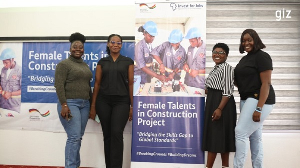Business News of Tuesday, 30 April 2024
Source: thebftonline.com
GhIE advocates increased female representation in construction industry
The Ghana Institution of Engineering (GhIE) has launched the Female Talents in Construction Project (FTC), with the goal of economically empowering women and reshaping their role in the construction sector. This project underscores GhIE’s commitment to promoting gender diversity and inclusivity in traditionally male-dominated industries.
To achieve its aim, the FTC project will upgrade the skills of 250 graduates from the GhIE and pre-tertiary TVET institutions – with a focus on women, and provide over 100 of them with new jobs after the training. The three-month project would run an intensive training course – one month of theory and two months of practical skills.
Participants are set to receive training in various fields, including carpentry, bricklaying, welding, construction, engineering, etc.
The FTC project will equip each participant with technical skill upgrade training, occupational health and safety training, business development skills training as well as licensing under the GhIE and the award of a German C-Certification.
During the launch, Team leader – Invest for jobs, GIZ Ghana, John Duti, highlighted that women constitute just 3 percent of workers employed in the construction sector, citing data from the ALIGN report. “During the 2020 Professionalisation of Artisans Project (ProfArts), spearheaded by the GhIE in collaboration with several private partners, it was revealed that out of the 2,228 beneficiaries, fewer than 20 were woman.”
He further emphasised that while it was recognised that most women often hesitate to enter male- dominated trades, the ProfArts project underscored the importance of actively encouraging women, particularly in the construction industry.
Addressing the deliberate focus on young graduates, he explained that the approach was necessary due to the existing academic gap, which has a negative impact on the sustainable growth of the sector. “Graduates are often challenged with efficiency and reliability in delivery due to lack of sufficient practical skills, the changing technology landscape and dealing with customer standards, among others,” he noted.
Mr. Duti further indicated that as a pilot, it will be upscaled upon successful completion to the remaining regions in Ghana.
Greater Accra Regional Director – Ghana Technical and Vocational Education and Training (TVET), Engr. Juliana Nkrumah, also urged participants to take seriously the opportunity given them and make the best out of it.











